可以免费使用的英语语料库资源
- 格式:doc
- 大小:48.50 KB
- 文档页数:3

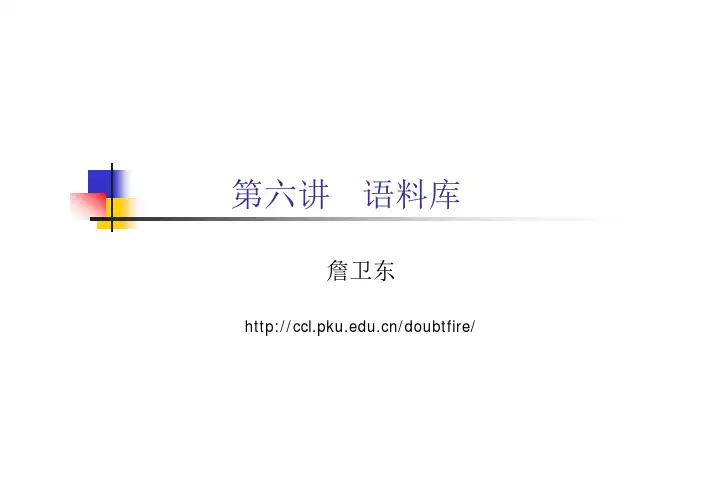
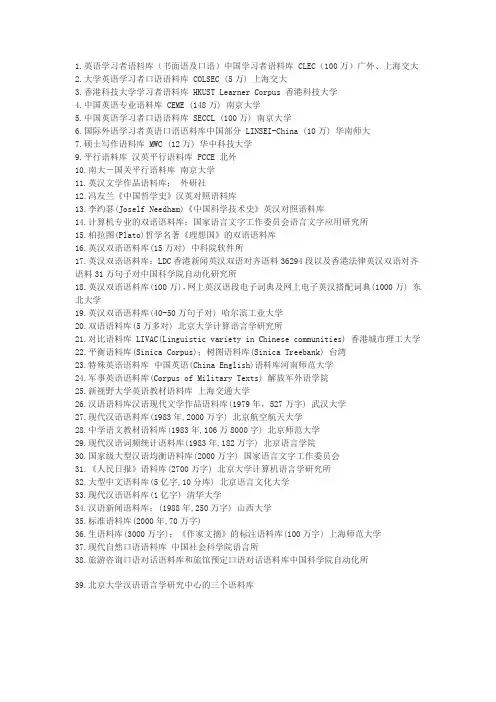
1.英语学习者语料库(书面语及口语)中国学习者语料库 CLEC(100万)广外、上海交大2.大学英语学习者口语语料库 COLSEC (5万) 上海交大3.香港科技大学学习者语料库 HKUST Learner Corpus 香港科技大学4.中国英语专业语料库 CEME (148万) 南京大学5.中国英语学习者口语语料库 SECCL (100万) 南京大学6.国际外语学习者英语口语语料库中国部分 LINSEI-China (10万) 华南师大7.硕士写作语料库 MWC (12万) 华中科技大学9.平行语料库汉英平行语料库 PCCE 北外10.南大-国关平行语料库南京大学11.英汉文学作品语料库;外研社12.冯友兰《中国哲学史》汉英对照语料库13.李约瑟(Joself Needham)《中国科学技术史》英汉对照语料库14.计算机专业的双语语料库;国家语言文字工作委员会语言文字应用研究所15.柏拉图(Plato)哲学名著《理想国》的双语语料库16.英汉双语语料库(15万对) 中科院软件所17.英汉双语语料库:LDC香港新闻英汉双语对齐语料36294段以及香港法律英汉双语对齐语料31万句子对中国科学院自动化研究所18.英汉双语语料库(100万),网上英汉语段电子词典及网上电子英汉搭配词典(1000万) 东北大学19.英汉双语语料库(40-50万句子对) 哈尔滨工业大学20.双语语料库(5万多对) 北京大学计算语言学研究所21.对比语料库 LIVAC(Linguistic variety in Chinese communities) 香港城市理工大学22.平衡语料库(Sinica Corpus);树图语料库(Sinica Treebank) 台湾23.特殊英语语料库中国英语(China English)语料库河南师范大学24.军事英语语料库(Corpus of Military Texts) 解放军外语学院25.新视野大学英语教材语料库上海交通大学26.汉语语料库汉语现代文学作品语料库(1979年,527万字) 武汉大学27.现代汉语语料库(1983年,2000万字) 北京航空航天大学28.中学语文教材语料库(1983年,106万8000字) 北京师范大学29.现代汉语词频统计语料库(1983年,182万字) 北京语言学院30.国家级大型汉语均衡语料库(2000万字) 国家语言文字工作委员会31.《人民日报》语料库(2700万字) 北京大学计算机语言学研究所32.大型中文语料库(5亿字,10分库) 北京语言文化大学33.现代汉语语料库(1亿字) 清华大学34.汉语新闻语料库;(1988年,250万字) 山西大学35.标准语料库(2000年,70万字)36.生语料库(3000万字);《作家文摘》的标注语料库(100万字) 上海师范大学37.现代自然口语语料库中国社会科学院语言所38.旅游咨询口语对话语料库和旅馆预定口语对话语料库中国科学院自动化所39.北京大学汉语语言学研究中心的三个语料库现代汉语语料库/yuliao.asp?item=1古代汉语语料库/yuliao.asp?item=2汉英双语语料库/yuliao.asp?item=3/printthread.php?t=2742汉语语料库使用权限国家语委语料库(http://219.238.40.213:8080/CpsQrySv.srf)”虽说是通用型平衡语料库,但不能完全免费使用;北京语言大学的汉语语料库(http://202.112.195.8)语料产出时间较早,且不能完全免费使用;北京大学汉语语言学研究中心语料库(现代汉语子库)”(/YuLiao_Contents.Asp)规模最大,逾亿字,但取样极不均衡,多半为文学作品;台湾“中央研究院”Sinica Corpus也是可免费使用的平衡汉语语料库。

我国学生英语口笔语语料库2.0在现代社会中,英语的重要性日益凸显。
作为全球通用的语言,掌握一定程度的英语能力不仅有利于个人的职业发展,还能丰富生活,促进国际交流与合作。
然而,对于我国学生来说,英语学习一直是一个重要的课题。
建立一份高质量的我国学生英语口笔语语料库2.0显得尤为重要。
让我们从中小学英语教育的现状说起。
随着我国改革开放的不断深入,英语作为一门重要的外语,也逐渐成为学校教育的一部分。
然而,传统的英语教学往往偏重于语法、词汇的机械记忆,而忽视了学生口语和写作能力的培养。
这导致了许多学生在英语交流和表达方面存在较大的障碍。
我国学生英语口笔语语料库2.0的建立,对于帮助学生提高口语和写作能力至关重要。
接下来,让我们深入探讨我国学生英语口笔语语料库2.0的意义。
通过收集学生的口语和写作作品,可以更好地了解学生在英语表达方面存在的问题和需求。
语料库的建立可以为教师提供更丰富的教学资源,帮助他们更好地指导学生,针对性地做出教学安排。
学生也可以通过语料库的参考,丰富自己的词汇量和表达能力,从而提高英语综合应用能力。
我国学生英语口笔语语料库2.0的建立还可以为学术研究提供重要的数据支持。
通过对学生口笔语表达的统计和分析,可以揭示学生在英语表达中常犯的错误、难点和特点,为相关学科研究提供重要的参考依据。
我国学生英语口笔语语料库2.0的建立对于提高学生的英语水平、改善英语教学质量、促进学术研究都具有重要意义。
希望有关部门能够高度重视这一问题,积极推动语料库的建设和使用,为我国学生的英语学习提供更好的支持和保障。
随着我国国际地位的提升,越来越多的人开始意识到英语在国际交流中的重要性。
作为一种全球通用的语言,英语不仅可以帮助人们更好地了解世界文化,还可以拓宽个人的职业发展渠道。
我国学生学习英语的重要性不言而喻。
然而,英语学习并非易事。
尤其是对于我国学生来说,英语口语和写作能力的不足一直是一个难题。
传统的英语教学模式注重了语法和词汇的灌输,对于学生的口语和写作能力的培养却偏少。

中国学生万篇英语作文语料库网址The Chinese Student English Essay Corpus (CSEEC) is a vast collection of over ten thousand English essays written by Chinese students from various educational levels. This corpus serves as a valuable resource for researchers, educators, and students interested in understanding the writing patterns, errors, and development of English writing skills among Chinese learners.The CSEEC can be accessed online through its dedicated website, which provides a user-friendly interface for searching, browsing, and analyzing the essays contained in the corpus. Users can search for specific topics, key words, or types of essays to explore the diverse range of writing styles and proficiency levels among Chinese students.One of the key benefits of the CSEEC is its potential for facilitating research in the field of second language acquisition. By analyzing the essays in the corpus, researchers can gain insights into the common errors, strategies, and development patterns of Chinese learners of English. This can inform the design of more effective teaching materials, methods, and assessments for English language learners in China.Educators can also benefit from the CSEEC by using it as a teaching resource in the classroom. By analyzing and discussing essays written by Chinese students, teachers can help students improve their writing skills and language proficiency. This can also help students develop a better understanding of cultural differences in writing styles and conventions between Chinese and English academic writing.For students, the CSEEC provides a valuable opportunity to compare their own writing with that of their peers and gain insights into common errors and strategies for improvement. By reading and analyzing essays in the corpus, students can identify areas for improvement in their own writing and learn from the successes and challenges of their peers.In conclusion, the Chinese Student English Essay Corpus is a valuable resource for researchers, educators, and students interested in understanding and improving the English writing skills of Chinese learners. By analyzing the essays in the corpus, users can gain valuable insights into writing patterns, errors, and development strategies among Chinese students, ultimately leading to improvements in English language teaching and learning in China.。

高中英语读后续写语料库③Her face was twisted with fury.她的脸因愤怒而扭曲。
④The room was filled with n and anger.房间里充满了紧张和愤怒。
⑤His voice was shaking with anger.他的声音因愤怒而颤抖。
⑥She clenched her fists in anger.她愤怒地握紧了拳头。
⑦I could feel the anger boiling inside me.我感觉到愤怒在我内心沸腾。
⑧He was seething with anger.他因愤怒而满腔怒火。
⑨Her words were dripping with anger.她的话语中充满了愤怒。
⑩I was consumed by anger.我被愤怒所吞噬。
⑪His face was red with anger.他因愤怒而脸红。
⑫The anger in the room was palpable.房间里的愤怒是可以感觉到的。
⑬She was shaking with anger.她因愤怒而颤抖着。
⑭I could see the anger in her eyes.我能从她的眼神中看出愤怒。
⑮His anger was like a storm brewing inside him.他的愤怒像是一场正在酝酿的暴风雨。
⑯She was seething with righteous anger.她因义愤填膺而满腔怒火。
⑰His anger was so intense that it was almost palpable.他的愤怒如此强烈,几乎可以感受到。
⑱The room was filled with the sound of angry voices.房间里充满了愤怒的声音。
3.悲伤烦恼He stood in silence。
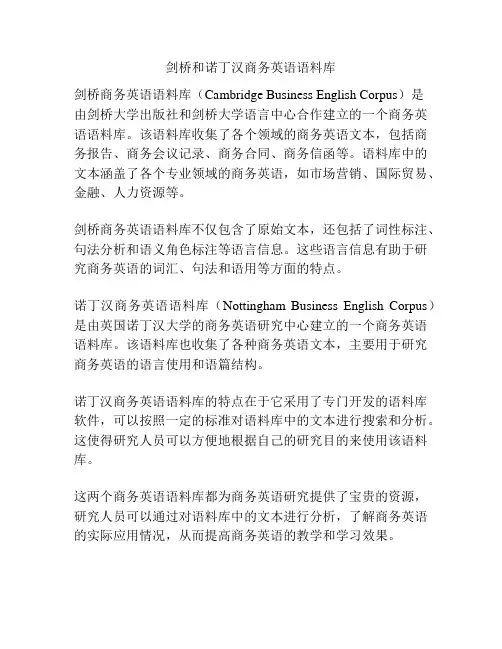
剑桥和诺丁汉商务英语语料库
剑桥商务英语语料库(Cambridge Business English Corpus)是
由剑桥大学出版社和剑桥大学语言中心合作建立的一个商务英语语料库。
该语料库收集了各个领域的商务英语文本,包括商务报告、商务会议记录、商务合同、商务信函等。
语料库中的文本涵盖了各个专业领域的商务英语,如市场营销、国际贸易、金融、人力资源等。
剑桥商务英语语料库不仅包含了原始文本,还包括了词性标注、句法分析和语义角色标注等语言信息。
这些语言信息有助于研究商务英语的词汇、句法和语用等方面的特点。
诺丁汉商务英语语料库(Nottingham Business English Corpus)是由英国诺丁汉大学的商务英语研究中心建立的一个商务英语语料库。
该语料库也收集了各种商务英语文本,主要用于研究商务英语的语言使用和语篇结构。
诺丁汉商务英语语料库的特点在于它采用了专门开发的语料库软件,可以按照一定的标准对语料库中的文本进行搜索和分析。
这使得研究人员可以方便地根据自己的研究目的来使用该语料库。
这两个商务英语语料库都为商务英语研究提供了宝贵的资源,研究人员可以通过对语料库中的文本进行分析,了解商务英语的实际应用情况,从而提高商务英语的教学和学习效果。
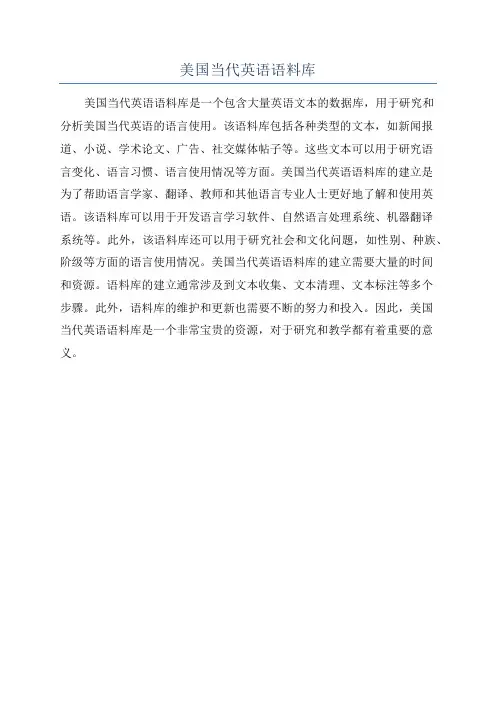
美国当代英语语料库
美国当代英语语料库是一个包含大量英语文本的数据库,用于研究和
分析美国当代英语的语言使用。
该语料库包括各种类型的文本,如新闻报道、小说、学术论文、广告、社交媒体帖子等。
这些文本可以用于研究语
言变化、语言习惯、语言使用情况等方面。
美国当代英语语料库的建立是
为了帮助语言学家、翻译、教师和其他语言专业人士更好地了解和使用英语。
该语料库可以用于开发语言学习软件、自然语言处理系统、机器翻译
系统等。
此外,该语料库还可以用于研究社会和文化问题,如性别、种族、阶级等方面的语言使用情况。
美国当代英语语料库的建立需要大量的时间
和资源。
语料库的建立通常涉及到文本收集、文本清理、文本标注等多个
步骤。
此外,语料库的维护和更新也需要不断的努力和投入。
因此,美国
当代英语语料库是一个非常宝贵的资源,对于研究和教学都有着重要的意义。
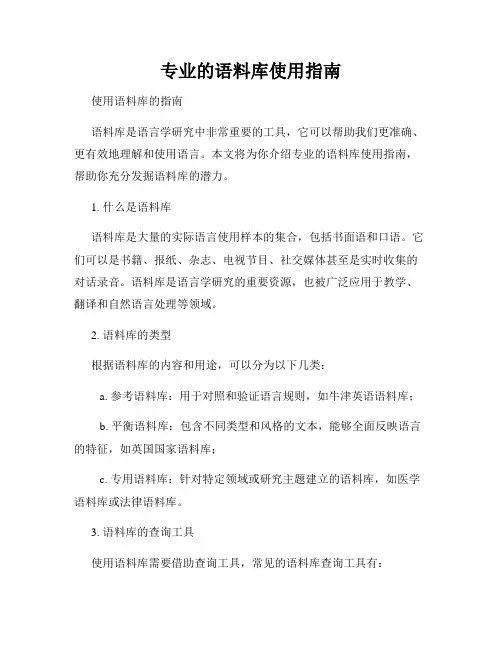
专业的语料库使用指南使用语料库的指南语料库是语言学研究中非常重要的工具,它可以帮助我们更准确、更有效地理解和使用语言。
本文将为你介绍专业的语料库使用指南,帮助你充分发掘语料库的潜力。
1. 什么是语料库语料库是大量的实际语言使用样本的集合,包括书面语和口语。
它们可以是书籍、报纸、杂志、电视节目、社交媒体甚至是实时收集的对话录音。
语料库是语言学研究的重要资源,也被广泛应用于教学、翻译和自然语言处理等领域。
2. 语料库的类型根据语料库的内容和用途,可以分为以下几类:a. 参考语料库:用于对照和验证语言规则,如牛津英语语料库;b. 平衡语料库:包含不同类型和风格的文本,能够全面反映语言的特征,如英国国家语料库;c. 专用语料库:针对特定领域或研究主题建立的语料库,如医学语料库或法律语料库。
3. 语料库的查询工具使用语料库需要借助查询工具,常见的语料库查询工具有:a. AntConc:一款免费的语料库查询软件,适用于初学者;b. Sketch Engine:提供多种语言的专业语料库,并提供灵活的查询和分析功能;c. WordSmith Tools:强大的语料库分析工具,适用于深度语言研究。
4. 如何利用语料库使用语料库可以帮助我们进行以下方面的研究和学习:a. 词汇研究:通过查询词频、词义、词组搭配等信息,帮助我们了解词汇的用法和搭配特点;b. 语法分析:通过查询句子结构、短语的用法等,帮助我们理解语法规则和句子的组织结构;c. 语用研究:通过查询对话和社交媒体文本,分析语言背后的交际意图和语境;d. 翻译与翻译评估:通过查询语料库中的双语对照文本,帮助我们进行翻译和评估翻译质量。
5. 案例分析下面以查询词汇搭配为例,来说明如何使用语料库进行研究。
假设我们想研究英语中"art"这个词汇的搭配用法。
我们可以选取一个平衡语料库,比如英国国家语料库,然后使用查询工具进行搜索。
查询结果将展示该词汇的出现频率、常见搭配以及不同领域中的应用情况。
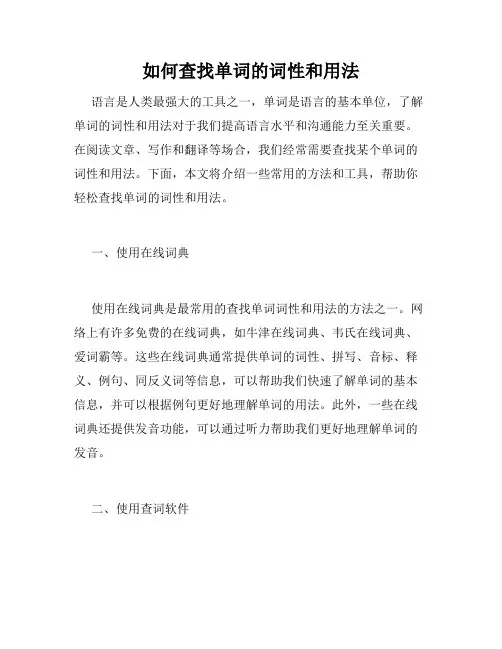
如何查找单词的词性和用法语言是人类最强大的工具之一,单词是语言的基本单位,了解单词的词性和用法对于我们提高语言水平和沟通能力至关重要。
在阅读文章、写作和翻译等场合,我们经常需要查找某个单词的词性和用法。
下面,本文将介绍一些常用的方法和工具,帮助你轻松查找单词的词性和用法。
一、使用在线词典使用在线词典是最常用的查找单词词性和用法的方法之一。
网络上有许多免费的在线词典,如牛津在线词典、韦氏在线词典、爱词霸等。
这些在线词典通常提供单词的词性、拼写、音标、释义、例句、同反义词等信息,可以帮助我们快速了解单词的基本信息,并可以根据例句更好地理解单词的用法。
此外,一些在线词典还提供发音功能,可以通过听力帮助我们更好地理解单词的发音。
二、使用查词软件与在线词典类似,查词软件也是查找单词词性和用法的常用工具。
常见的查词软件有“欧路词典”、“金山词霸”、“有道词典”等。
这些软件有着更加灵活的使用方式,可以离线使用,并且一些软件还提供单词的同反义词、派生词、短语等信息,可以帮助我们更加深入地了解单词。
此外,一些查词软件还提供单词的记忆功能,可以帮助我们更有效地记忆单词的词性和用法。
三、使用语料库语料库是一个包含大量语言样本的数据库,它可以为我们提供单词在实际语境中的使用情况。
目前的语料库主要分为两种类型:可搜索的和不可搜索的。
常见的可搜索语料库有“英语语料库”、“金山词霸语料库”等。
使用语料库可以帮助我们更准确地理解单词的用法,了解单词在不同语境中的语法和语义规律,也可以帮助我们丰富自己的表达方式。
四、使用语法书籍语法书籍是学习语言的重要工具之一。
在一些语法书籍中,单词的词性和用法是必不可少的内容。
常见的语法书籍有“剑桥英语语法入门”、“牛津英语语法大全”等。
这些书籍结构清晰,内容丰富,不仅可以帮助我们巩固已学的语法知识,而且还可以帮助我们深入了解英语中各个语法点的用法,提高我们的语言水平。
总之,了解单词的词性和用法对于我们提高语言水平和沟通能力至关重要,使用以上方法和工具可以帮助我们轻松查找单词的词性和用法。

top20000个当代英语语料库单词全文共10篇示例,供读者参考篇1Hello friends! Today I want to talk about the top 20,000 words in the contemporary English language. Whoa, that's a lot of words, right? But don't worry, I'm here to break it down for you in a fun and easy way.So, what exactly are these top 20,000 words? Well, they are the most commonly used words in English. That means you're likely to hear or see these words a lot in books, TV shows, movies, and everyday conversations. Pretty cool, right?Now, let's talk about some of these top words. We have simple words like "the", "and", "is", "you", "I", "he", "she", and "it". These are called pronouns and they help us talk about people or things without using their names all the time. So, instead of saying "The dog is cute", we can say "It is cute".Next, we have words like "to", "of", "in", "for", "on", and "with". These are called prepositions and they show how things are related to each other. For example, "I'm going to the park", "The cat is sleeping on the bed", or "She's playing with her toys".Prepositions are like little connectors that help make our sentences more interesting.Now, let's talk about some fun words like "happy", "sad", "funny", "cool", "smart", and "kind". These are called adjectives and they describe how things look, feel, or sound. For example, "She's a kind person", "He's a smart student", or "The movie was funny". Adjectives add color and emotion to our sentences.And of course, we can't forget about action words like "run", "jump", "dance", "sing", "play", and "work". These are called verbs and they show what someone or something is doing. For example, "The dog is running fast", "She loves to sing", or "He's working hard". Verbs keep the action going in our sentences.There are also words like "house", "car", "book", "school", "friend", and "family". These are called nouns and they name people, places, or things. For example, "I live in a house", "She drives a car", or "He's reading a book". Nouns help us talk about the world around us.So, there you have it! The top 20,000 words in the contemporary English language. Pretty neat, huh? By knowing and using these words, you'll be able to express yourself better and communicate with others more effectively. Keep learningand exploring the wonderful world of words! Stay curious and have fun with the English language. Bye for now!篇2Once upon a time, there was a super cool list called the Top 20000 Contemporary English Corpus Words. This list had all the words that people use every day in English. It was like a treasure trove of words waiting to be explored and used in all sorts of ways.One day, a group of friends decided to check out this list and see what all the fuss was about. They gathered around their computer and started scrolling through the words. There were words like "fun", "happy", "exciting", "play", "jump", and many more. They were so amazed at all the words they found on the list.The friends decided to challenge each other to use the words from the list in different sentences. They had to come up with creative ways to incorporate the words into their everyday conversations. It was like a fun game that tested their vocabulary skills and creativity.One of the friends said, "I feel so happy when I play with my friends at the park. We jump and run around, having so much funtogether." Another friend added, "I love to read exciting books that take me on adventures to faraway places. It's like escaping reality for a little while."The friends continued to explore the list of words and found even more interesting ones like "surprise", "magic", "dream", "laugh", and "shine". They were fascinated by how each word had its own unique meaning and could be used in different contexts.As they used the words in their conversations, they noticed how their language skills improved. They were able to express themselves more clearly and creatively, making their conversations more engaging and fun.The friends realized that the Top 20000 Contemporary English Corpus Words were like a magic wand that helped them unlock a whole new world of possibilities in their communication. They were grateful for the list and promised to continue exploring and learning new words every day.And so, the friends continued their journey of discovery and growth, armed with the power of words from the Top 20000 list. They knew that with each word they learned and used, they were becoming better communicators and storytellers.And they lived happily ever after, speaking confidently and eloquently with the help of their trusty list of words. The end.篇3Hey guys! Today I'm gonna tell you about the top 20000 most common English words! I know it sounds like a lot, but don't worry, I'll break it down for you.So, these words are the ones that people use the most in everyday conversations. They are super important because they help us communicate with each other. Whether we're talking to our friends, our teachers, or even just reading a book, these words come in handy.Some of the top 20000 words are things we use all the time, like "hello," "goodbye," "please," and "thank you." These words make our conversations polite and friendly. Other words are things we see every day, like "house," "car," "dog," and "cat." They help us describe the world around us.There are also words that help us talk about our feelings, like "happy," "sad," "angry," and "excited." And let's not forget about the words that help us ask questions like "who," "what," "when," and "where."Learning these words can help us have better conversations and understand what other people are saying. So next time you hear a word you don't know, don't be afraid to ask what it means. You might just add a new word to your list of top 20000 English words!Keep practicing and soon enough you'll be a pro at using these common words in your everyday conversations. Have fun learning and happy chatting, everyone!篇4Hey guys! Today I want to talk about the top 20000 contemporary English language corpus words. Sounds fancy, right? But don't worry, I'll explain everything in a fun way that even a little kid can understand!So, what exactly are these top 20000 words? Well, they are basically just a list of common words that are frequently used in the English language. These words are important because they form the foundation of our communication. Without them, we wouldn't be able to express ourselves properly or understand what others are saying.Some of these words are super basic, like "apple" or "dog". You probably use these words every day without even thinkingabout it. But there are also some more complicated words on the list, like "synonym" or "metaphor". These words help us to express more complex ideas and emotions.One cool thing about the top 20000 words is that they are constantly changing and evolving. New words are being added all the time, especially with the rise of technology and social media. Words like "selfie" and "emoji" are now part of our everyday vocabulary, even though they didn't exist a few years ago.Learning these top 20000 words is important because it can help us to become better communicators. The more words we know, the more accurately we can express ourselves and understand others. Plus, it's just fun to learn new words and expand your vocabulary!So, next time you come across a word that you don't know, don't be afraid to look it up and add it to your own personal list of top 20000 words. Who knows, maybe you'll even impress your friends and teachers with your newfound vocabulary!That's all for now, guys. I hope you enjoyed learning about the top 20000 words with me. Keep on reading, talking, and learning new words every day. See you next time!篇5Hey guys! Today I want to talk to you about the top 20000 words in contemporary English language! It may sound like a lot, but don't worry, we can learn some of these together!First, let's talk about some common words we use every day. Words like "hello", "goodbye", "please" and "thank you" are important for being polite and friendly.Next, we have words that describe things, like "dog", "cat", "ball" and "book". These words help us talk about the world around us.Then, there are words that describe actions, like "run", "jump", "eat" and "sing". These words are fun to use when we're playing games or telling stories.We also use words to talk about feelings, like "happy", "sad", "angry" and "excited". It's important to share our feelings with others so they know how we're doing.In addition, we have words that help us connect ideas, like "and", "but", "because" and "so". These words help us tell stories and explain things to others.There are also words that give more details, like "big", "small", "fast" and "slow". These words help us paint a picture in our minds.Finally, there are words that show ownership, like "my", "your", "his" and "her". These words help us talk about who something belongs to.Learning these words will help us communicate better with others, both in person and in writing. So let's keep practicing and using these words every day!I hope you learned something new today about the top 20000 words in contemporary English language. Keep practicing and soon you'll be a pro at using them all! Thanks for listening!篇6Title: My Favorite Top 20000 Words from the Contemporary English CorpusHey there! Today I want to share with you some really cool words that are part of the top 20000 words from the Contemporary English Corpus. These words are super important and used a lot in everyday English, so I think it's really awesome to know them!Let's start with the word "love". Love is such a beautiful word that means caring about someone deeply and wanting to make them happy. It's all about spreading kindness and positivity in the world. I love to use the word "love" because it makes me feel warm and fuzzy inside.Next up is the word "happy". Being happy is one of the best feelings in the world. It's when you feel joyful, content, and at peace with yourself and others. I love to see people smiling and laughing because it shows that they are happy.Another word I really like is "friend". Friends are the best! They are the people who support you, make you laugh, and always have your back. Having good friends is so important because they make our lives so much better.One word that is really cool is "awesome". When something is awesome, it means it's really amazing and impressive. Like when you see a beautiful sunset or win a game, you can say, "That was awesome!"A word that is often used in school is "learn". Learning is so important because it helps us grow and understand the world better. Whether we're learning math, science, or even a new hobby, it's always cool to learn new things.One word that is used a lot in stories and movies is "adventure". Adventures are exciting journeys or experiences that take us to new places and give us unforgettable memories. I love going on adventures with my friends and family.The word "kind" is another word that I really like. Being kind means being friendly, generous, and considerate towards others. It's so important to be kind to everyone we meet because it makes the world a better place.One word that is really fun to say is "banana". Bananas are delicious fruits that are full of vitamins and energy. They are my favorite snack to eat during the day because they are tasty and good for me.The word "dream" is a word that is full of possibilities. Dreams are our hopes, goals, and desires for the future. It's important to have dreams because they inspire us to work hard and achieve great things.Another word that is really important is "family". Family is a group of people who love and care for each other. They are always there for us through good times and bad. I love spending time with my family because they make me feel safe and loved.Lastly, the word "create" is a word that I think is really cool. To create means to make something new or original. Whether it's drawing, writing, or building, creating things is so much fun and brings out our creative side.I hope you enjoyed learning about some of my favorite words from the top 20000 words in the Contemporary English Corpus. Remember, words are powerful and can help us express our thoughts and feelings in so many different ways. Keep exploring new words and using them in your everyday life! Keep learning and growing every day. Bye for now!篇7Hey guys, have you ever heard of the top 20000 words in contemporary English language? It's pretty cool and there are some really interesting words in there! Let me tell you all about it.So, these top 20000 words are like the most commonly used words in English. That means we use them a lot when we talk or write. It's important to know these words because they help us to communicate better and understand things more easily.Some of the words in the top 20000 list are really simple, like "hello" and "goodbye". We use these words all the time when wegreet someone or say farewell. Then there are words like "happy" and "sad" which describe our feelings. It's fun to learn how to express our emotions with words!There are also words that describe things around us, like "tree" and "car". These words help us to talk about the world we see every day. And don't forget about words that help us to ask questions, like "who" and "what". Asking questions is a great way to learn more about something or someone.Now, let's talk about some cool words that are in the top 20000 list. Have you ever heard of the word "penguin"? It's a bird that can't fly but it swims really well. Penguins are so cute and funny to watch! Another interesting word is "butterfly". It's a beautiful insect that flies around with colorful wings. Have you ever seen a butterfly up close? They are so pretty!There are also some words that are a little harder to understand, like "prestigious" and "metamorphosis". These words sound fancy but they are actually pretty cool once you know what they mean. "Prestigious" means something is very respected or admired, while "metamorphosis" means a big change or transformation. It's fun to learn new words and their meanings!Learning new words from the top 20000 list can be really exciting. It helps us to expand our vocabulary and become better at expressing ourselves. So, let's keep exploring the world of words and have fun with language! Have a great day, everyone!篇8Hey everyone! Today I'm going to talk about the top 20000 words in the contemporary English language! It's super duper cool and interesting to learn about all these words that people use every day.So the first word on the list is "the". It's a really common word that we use all the time. It's like when we say "the dog" or "the cat". It helps us know which thing we're talking about.Next up is "I". We use this word to talk about ourselves. Like when we say "I want to play" or "I like ice cream".Oh, and don't forget about "you"! It's a word we use to talk to someone else. Like when we say "Can you pass me the crayons?" or "You are my friend".There are so many words on this list that we use every day. Like "love", "happy", "play", "go", "eat" and so many more. It's so cool to see all the words that make up the English language.I hope you enjoyed learning about the top 20000 words in the contemporary English language. It's pretty neat to see all the words that we use every day without even thinking about it. Keep on learning and exploring new words! Bye!篇9Today I'm gonna tell you all about the top 20000 words in the contemporary English language! Cool, right? So buckle up and get ready for a fun ride through the wonderful world of words!First off, what exactly is a "word"? Well, a word is a unit of language that carries meaning. It's like a building block in the vast structure of a language. English has thousands and thousands of words, but some are used more frequently than others. These are the top 20000 words in the language.So, why are these words important? Well, they are the ones that are most commonly used in everyday conversation, writing, and reading. By knowing these words, you can better understand and communicate with others in English.Let's start with some basic words that you probably use all the time without even realizing it. Words like "the," "and," "I," "you," and "he" are among the most frequently used words inEnglish. These are the building blocks of sentences and are essential for communication.Next, we have words that help us describe things. Adjectives like "big," "small," "hot," and "cold" allow us to paint a picture with our words. We can also use verbs like "run," "jump," "eat," and "sleep" to talk about actions. These words help us bring our stories and experiences to life.Then, there are words that connect our ideas and thoughts. Words like "because," "although," "and," and "but" help us link different parts of a sentence or paragraph. These words are crucial for creating a coherent and logical flow in our writing and speaking.Of course, we can't forget about words that express emotions and feelings. Words like "happy," "sad," "angry," and "surprised" allow us to convey how we're feeling to others. These words help us connect with others on a deeper level and build meaningful relationships.As we continue to explore the top 20000 words in English, we come across a wide range of vocabulary, from common words like "house," "car," and "dog" to more advanced words like "phenomenon," "equilibrium," and "perspective." Each word has its own unique meaning and role in the language.By expanding your vocabulary and learning new words, you can become a more effective communicator and express yourself more clearly and accurately. So, don't be afraid to dive into the world of words and discover the endless possibilities that language has to offer.In conclusion, the top 20000 words in the contemporary English language are like a treasure trove waiting to be explored. By mastering these words, you can unlock the full potential of the language and open up new opportunities for learning and growth. So, keep on expanding your vocabulary and never stop exploring the wonderful world of words!篇10Hey guys, today I'm gonna tell you all about the top 20,000 words in the contemporary English language! That's a lot of words, so let's dive right in and see what cool words we can learn.First up, we have words like "the," "and," "is," and "it." These are called the most common words in English because we use them all the time. Then there are words like "you," "that," "he," and "she." These are pronouns that we use to talk about people and things.Next, we have words like "love," "happy," "sad," and "angry." These are all emotions that we feel and express through our words. Words like "friend," "family," "home," and "school" are all about the people and places that are important to us.Now, let's talk about some fun words like "banana," "candy," "pizza," and "ice cream." These are all yummy foods that we love to eat! Words like "dog," "cat," "bird," and "fish" are all about animals that we see and love.Moving on, we have words like "run," "jump," "play," and "dance." These are all actions that we do to have fun and stay active. Words like "big," "small," "tall," and "short" describe the size and shape of things.Let's not forget about words like "beautiful," "ugly," "smart," and "silly." These are all adjectives that describe how things look and behave. Words like "fast," "slow," "loud," and "quiet" describe the speed and volume of things.And finally, we have words like "hello," "goodbye," "please," and "thank you." These are all polite words that we use to be kind and respectful to others. So remember, using words is a super fun way to express ourselves and communicate with others.So there you have it, guys! The top 20,000 words in the contemporary English language. I hope you learned some new words and had fun exploring the wonderful world of vocabulary. Keep on learning and growing your language skills, and who knows, maybe one day you'll be a vocabulary expert too! Thanks for listening, bye-bye!。
- 217 -校园英语 / 语言文化研究基于COCA语料库英语同义词辨析——以Compulsory和Mandatory为例成都理工大学外国语学院/郭齐园 金铠【摘要】本文基于语料库的研究方法,以compulsory和mandatory为例,利用美国当代英语语料库COCA从不同语域的词频分布、搭配特征、句法结构等方面,结合定性和定量的方法,辨析英语同义词。
本研究对英语教学和实践提供了一种有效的手段和视角,以语料库为基础的英语同义词教学有一定的借鉴意义。
【关键词】COCA语料库 同义词 搭配特征 类连接统计数据表明,同义词占到所有英语单词的60%以上。
传统方法是词典学习,老师自身经验,学生内化。
此类学习方法宏观,不具体。
而COCA 语料库在辨析同义词,微观,具体。
一、语料库语言学背景20世纪中后期,语料库语言学对于辨析同义词的研究成为一种新的方法,具有语言真实,数据量大,检索快速。
在语言学中,语料库即大量文本的集合,库中的文本(称为语 料),通常经过整理,具有既定的格式与标记,特指计算机存储的数字化语料库。
语料库是语料库语言学研究的基础资源,也是经验主义语言研究方法的主要资源。
应用于词典编纂、语言教学、传统语言研究、自然语言处理中基于统计或实例的研究等方面。
语料库可分成四种类型:(1)异质的:没有特定的语料收集原则,广泛收集并原样存储各种语料;(2)同质的:只收集同一类内容的语料;(3)系统的:根据预先确定的原则和比例收集语料,使语料具有平衡性和系统性,能够代表某一范围内的语言事实;(4)专用的:只收集用于某一特定用途的语料。
COCA 是当前重要的语料库工具之一,全称为美国当代英语语料库,可免费在线使用且分布均匀,其涵盖SPOK ,FIC ,MAG ,NEWS ,ACAD 五个部分。
二、研究对象及工具1. compulsory 和mandatory 在字典中的定义。
《牛津高阶英汉双解词典,(7th Edition)》中,compulsory 解释为:that must be done because of a law or a rule (因法律或规则 而)必须做的,强制的,强迫的;短语和例句有:Compulsory education / schooling 义务教育、Compulsory redundancies 强制裁员等。
英语听力语料库
英语听力语料库是一种按照一定的采样标准采集而成的电子文本集,它可以代表一种语言或某语言的一种变体或文类。
语料库对于英语听力学习有着重要的作用,因为它可以为学习者提供真实的语言材料,帮助学习者更好地理解语言的结构和用法。
英语听力语料库中包含了大量的听力材料,这些材料可以是电影片段、新闻广播、演讲、课堂讨论等等。
学习者可以通过听这些材料来提高自己的听力技能,学习地道的英语表达方式,增强对英语语言的理解和感知能力。
此外,英语听力语料库还可以帮助学习者更好地了解英语语言的特点和规律。
通过分析语料库中的语言数据,学习者可以发现英语语言的常用词汇、短语和句型,以及语言在不同语境中的使用情况。
这些发现可以帮助学习者更好地掌握英语语言的运用,提高他们的口语和写作能力。
总之,英语听力语料库是一种非常有用的学习资源,它可以为学习者提供真实的语言材料,帮助学习者更好地理解语言的结构和用法,提高他们的听力技能和英语语言能力。
雅思口语语料库雅思口语语料库雅思口语考试是衡量一个考生英语口语水平的重要指标,而语料库则是口语考试备考的重要资料。
在备考雅思口语考试时,我们需要有一些好的语料库,这些材料可以帮助我们迅速提升口语表达能力,为我们的口语考试提供更多的素材。
一、语言表达能力相关的雅思口语语料库1. 表示同意的句子当你同意别人的观点时,可以使用以下句子:I couldn't agree more. / I totally agree with you. / Absolutely. / That’s right. / Exactly my point. / You’ve hit the nail on the head. / Precisely. / I’m with you on this one.2. 表示不同意的句子当你对别人的观点持有不同意见时,可以使用以下句子:I see your point, but… / I’m not so sure about that. / That’s not quite how I see it. / I have a different view. / I respectfully disagree. / Hmm, I’m not convinced. / I’m afraid I can’t agree with you on this one.3. 提问和回答在雅思口语考试中,问题和回答的部分非常重要。
以下是一些常用的提问和回答的用语:What do you think about…? / If you had to choose…? / Do you prefer… or…? / What’s your take on that? / Can you give mean example? / What’s your opinion? / Why do you think that is? / That’s a good question. / Well, I think…二、话题相关的雅思口语语料库1. 食物在讨论食物时,以下是一些常用的用语:I’m a big fan of ( Mexican food). / My favorite food is ( sushi). /Have you tried ( dim sum)? / I can’t stand ( spicy food). / I’m not a big fan of (seafood). / I’m trying to cut down on ( junk food). / I think ( Italian cuisine) is the best in the world.2. 旅行以下是一些表达旅行经验和偏好的句子:I’ve been to ( Tokyo) twice. / My favorite place to visit i s ( New York). / I love exploring new cultures. / I’m not a big fan of ( touristy places). / I’m planning to visit ( Australia) next year. / The most memorable trip I’ve ever had was ( backpacking in Europe). / I think the best way to travel is ( to immerse oneself in the local culture).3. 媒介讨论媒介(电影、音乐、电视节目等)时,以下是一些常用的句子:My favorite movie of all time is ( Forrest Gump). / I’m a big fan of ( Adele). / I love watching ( Game of Thrones). / I think the best book I’ve ever read is ( To Kill a Mockingbird). / I don’t really like ( horror movies). / I think ( classical music) is veryrelaxing.以上是一些常用的雅思口语语料库,使用它们可以帮助我们更好地准备雅思口语考试,提高口语表达能力,更好地交流。
英语语料库及词频表介绍
英语语料库是收集英语书面和口语等各类英文表述方式的语言材料集合,涵盖了英语词汇的各个方面。
其中,目前主流的有三个语料库,分别是GBC(Google Book's Corpus)、BNC(British National Corpus)和COCA(Corpus of Contemporary American English)。
COCA(Corpus of Contemporary American English)是由美国伯翰大学(Brigham Young University)的Mark Davies教授开发的美国最新当代英语语料库,是当今世界上最大的英语平衡语料库。
它涵盖了美国这一时期的口语、小说、流行杂志、报纸和学术期刊五大类型的语料库,并且这五个方面基本上成均匀平衡分布。
COCA词频表基于COCA的5亿单词语料库,利用算法提取出来最高的前5000和20000的高频词,并注释了搭配,解决了单词最实际的实用问题。
如需更多关于英语语料库及词频表的信息,建议咨询英语专业人士或查阅相关文献资料。
英国国家语料库BNC在英语词汇教学中的应用【摘要】本文以作者的高中英语词汇教学实践为基础,阐述在高中英语教学过程中如何借助英国国家语料库BNC实现有效的词汇教学。
该文旨在通过实例展示BNC语料库在英语词汇教学中的应用,拓宽学生英语学习渠道,建立探究式、自主式英语词汇学习模式提供有力的依据,实现英语学科核心素养的培养目标。
【关键词】高中英语;词汇教学;英语国家语料库BNC一、引言语料库(corpus)指的是“A collection of naturally occurring language text, chosen to characterize a state or variety of a language. ”(Sinclair,1991)。
中国学者对corpus也有自己的解释“语料库是指按照一定的语言学原则,运用随机抽样的方法,收集自然出现的连续的语言文本或话语片段而建成的具有一定容量的大型电子文库。
”(赵俊峰等,2010)在计算机技术的发展之下,语料库自上世纪50年代开始发展,在其发展初期,仅对词语进行一般分析,如词频统计等,之后增加了对于词语的语法属性标注,例如:词性。
语料库发展到现在,使用者们越来越重视对例如:语音、构词、句法、语义以及语用层面的标注。
随着计算机技术的普及以及网络技术的飞速发展,计算机在外语学习中的辅助作用越来越显著。
英语语料库在英语学习者和使用地道的语言中起着不可估量的作用。
经过近70年的发展和提升,语料库语言学无论在理论上还是技术上都已趋于成熟,得到了越来越多的专家认可,其应用范围也趋于广泛,涉及语言分析、语言教学、词典编撰到大数据、人工智能等领域。
语料库应用于外语教学已有30多年时间,英国伯明翰大学语言学专家Tim Johns于1994年提出数据驱动型学习方法(Data-Driven Learning, DDL),指的是语言学习者运用语料库数据和教育语料库的方法自主进行语言学习的过程。
雅思语料库1. 引言雅思(International English Language Testing System)是被广泛认可的全球英语水平测试。
许多人都在为取得一定的雅思成绩而努力学习英语。
然而,备考雅思并非易事,需要掌握各种语法、词汇、听力、口语和阅读等技能。
在备考过程中,积累大量的雅思语料库是非常重要的,这将帮助考生熟悉雅思试题的格式和常见的考点,并提高他们的语言运用能力。
2. 雅思语料库的定义雅思语料库是指收集和整理的相关于雅思考试的语言材料的合集。
它包括了各个语言技能的实例,例如听力材料、口语题目、阅读文章和写作例子等。
雅思语料库可以帮助考生更好地了解雅思考试的要求和格式,并提供实际的语言材料供学习使用。
3. 雅思语料库的作用雅思语料库的作用是多方面的。
首先,它提供了实际的语言材料,可以帮助考生熟悉雅思试题的类型和难度。
通过研究和分析雅思语料库,考生可以了解到哪些语法点、词汇和表达方式是常见的,从而更有针对性地进行备考。
其次,雅思语料库提供了口语题目和写作例子,可以帮助考生练习自己的口语和写作能力。
考生可以通过模仿和改写雅思语料库中的材料来提高自己的语言表达能力。
另外,雅思语料库还可以帮助考生提高听力和阅读的技能。
通过反复听雅思语料库中的听力材料和阅读文章,考生可以逐渐熟悉雅思听力和阅读的考点和题型,并提高自己的听力和阅读能力。
4. 如何获取雅思语料库获取雅思语料库的方法有多种。
首先,可以通过参加雅思培训班来获取。
许多雅思培训机构都会提供一些雅思语料库供学生使用。
其次,互联网上也有许多网站提供免费或付费的雅思语料库下载。
考生可以根据自己的需求选择适合的网站下载语料库。
此外,一些书店和图书馆也提供了一些与雅思备考相关的书籍和资料。
考生可以通过购买或借阅这些书籍来获取雅思语料库。
5. 如何有效使用雅思语料库在使用雅思语料库时,考生需要注意以下几点。
首先,要有目标性地使用语料库。
考生可以根据自己的备考需求和弱势领域选择适当的语料库进行学习。
可以免费使用的大型英语语料库资源
常用语料库资源链接汇集(语料天涯)
http://202.204.128.82/sweccl/Corpus/
/netprints/Corporalink/Corporalink.htm
1. BNC-World Simple Search ☆☆☆
/lookup.html
But no more than 50 hits will be displayed, with a fixed amount of context.
2. Brown, LOB, BNC sampler ☆☆☆
Here are a few links for searching corpora online, including monolingual corpora like Brown, LOB, and BNC sampler and also some parallel English-Chinese corpora. English: /concordance/WWWConcappE.htm
English: http://www.lextutor.ca/concordancers/concord_e.html
Parallel: /concordance/paralleltexts/
3. Collins Cobuild Corpus Concordance Sampler☆☆☆☆☆
/Corpus/CorpusSearch.aspx
The Collins WordbanksOnline English corpus is composed of 56 million words of contemporary written and spoken text.
4. New BNC interface - VIEW: ☆☆☆☆☆
/
5. Samples (about 2 million words) from the British National Corpus: both written and spoken ☆☆☆
The Brown Corpus and many others - native, learner...
Go to http://www.lextutor.ca/concordancers/concord_e.html
6. MICASE ☆☆☆☆
/m/micase/
There are currently 152 transcripts (totaling 1,848,364 words) available at the site.
7. CLEC online concordancing ☆☆☆☆
/corpus/EngSearchEngine.aspx
CLEC收集了包括中学生、大学英语4级和6级、专业英语低年级和高年级在内的5种学生的语料一百多万词,并对言语失误进行标注。
For an introduction of the corpus, its error tagset and some statistics, see
/baseinfo/achievement/Achievement1.htm
8. Business Letter Corpus Online KWIC Concordancer ☆☆☆
1 MILLION WORDS BUSINESS LETTER CORPUS (US & UK) AND OTHER CORPORA seek.co.jp/
9. Virtual Language Centre ☆☆☆
/concordance
The Starr Report, Brown, LOB, The Times (Jan, Feb, Mar) 3 files, SCMP, Business & Economy, Computing etc
10. Time Magazine archive ☆☆☆, 1923-2007 (100+ million words)
/time/ and more at /
11. Just the word
http://193.133.140.102/JustTheWord/
书店可以买到的语料库相关书籍
Austermühl, F. 2001. Electronic Tools for Translators《译者的电子工具》. Manchester: St.
Jerome Publishing. (外研社引进)
Biber, Douglas, Stig Johansson, Geoffrey Leech, Susan Conrad & Edward Finegan. 1999.
Longman Grammar of Spoken and Written English. Longman Publications Group.
(外研社引进)
Biber, Douglas, Susan Conrad & Randi Reppen. 1998. Corpus Linguistics. Cambridge: Cambridge University Press. (外研社引进)
Granger, S. et al. (eds.). 2003. Corpus-based Approaches to Contrastive Linguistics and Translation Studies《基于语料库的语言对比和翻译研究》. Amsterdam: Rodopi. (外研社引进)
Gries, Stefan Thomas. 2004. Multifactorial Analysis in Corpus Linguistics: A Study of Particle Placement. Beijing: Peking University Press. (北大出版社引进)Hunston, Susan. 2002. Corpora in Applied Linguistics. Cambridge: Cambridge. University Press. (世界图书出版社引进)
Kennedy, Graeme. 1998. An Introduction to Corpus Linguistics. London: Longman. (外研社引进)
Nattinger, James R. & Jeanette S. DeCarrico. 1992. Lexical Phrases and Language Teaching. Oxford: Oxford University Press. (外教社引进)
Sinclair, John. 1991. Corpus, Concordance, Collocation. Oxford: Oxford University Press.
(外教社引进)
Thomas, Jenny & Mick Short. 1996. Using Corpora for Language Education. London: Pearson Education. (外研社引进)
Zanettin, F., et al. (eds.). 2003. Corpora in Translator Education《语料库与译者培养》.
Manchester: St. Jerome Publishing. (外研社引进)
蔡金亭,2003,《语言因素对英语过渡中使用——一般过去时的影响》。
北京:外语教学与研究出版社。
何安平(主编),2004,《语料库在外语教育中的应用:理论与实践》。
广州:广东高等教育出版社出版。
何安平,2004,《语料库语言学与英语教学》。
北京:外语教学与研究出版社。
华南师范大学外国语学院编,2005,《语料库语言学的研究与应用》。
长春:东北师范大学出版社。
黄昌宁,李涓子著,2002,《语料库语言学》。
北京:商务印书馆。
濮建忠,2003,《学习者动词行为:类联接、搭配及词块》。
开封:河南大学出版社。
王建新,2005,《计算机语料库的建设与应用》。
北京:清华大学出版社。
王克非等,2004,《双语对应语料库研制与应用》。
北京:外语教学与研究出版社。
王立非、梁茂成等,2007,《计算机辅助第二语言研究方法与实用》。
北京:外语教学与研究出版社。
卫乃兴,2002,《词语搭配的界定与研究体系》。
上海:上海交通大学出版社。
卫乃兴,李文中,濮建忠等,2005,《语料库应用研究》。
上海:上海外语教育出版社。
文秋芳、王立非、梁茂成,2005,《中国学生英语口笔语语料库》。
北京:外语教学与研究出版社。
【含SWECCL语料库光盘】
杨达复,2000,《英语错误型式分析》。
西安:陕西人民出版社。
杨惠中、桂诗春,2003,《中国学习者英语语料库》。
上海:上海外语教育出版社。
【含CLEC 语料库光盘】
杨惠中、卫乃兴,2005,《中国学习者英语口语语料库建设与研究》。
上海:上海外语教育出版社。
【含COLSEC语料库光盘】
杨惠中等(主编),2005,《基于CLEC语料库的中国学习者英语分析》。
上海:上海外语教育出版社。
杨惠中主编,2002,《语料库语言学导论》。
上海:上海外语教育出版社。
2013年7月26日星期五。